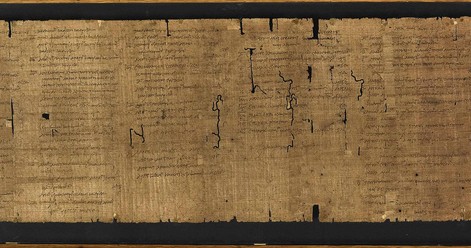This is the second in a 5 week series exploring the relationship between miracles and science. See this Science Corner post for a prelude, and this post for part 1.

Last week, we started our exploration of miracles by looking at the roots of Israel’s monarchy in 1 Samuel 8. We considered how that transition would drastically shape both that nation and the Bible. In that story, we are told that God cautioned his people on the implications of their choice of government. I proposed that God had two main concerns. First, allegiance to their human king could become a higher priority for the Israelites than their existing commitments to God. Second, human kings would provide poor models of kingship, leading us to make incorrect inferences about what God is like as a king.
Metaphors are central to God’s efforts to make himself known to us. The wisdom literature of the Old Testament illustrates various aspects of God through metaphors from nature and human experience. Jesus explained the kingdom of God through parables. Jesus himself came so that, by knowing him, we could know God. God cares which metaphors we use to know more about him.
One common, long-standing description of science is the process of identifying the laws of nature. For the Christian, those laws were enacted by God. This is part and parcel with God’s position as king; kings pass laws and their subjects obey them. If all of creation is under God’s dominion, it seems only reasonable to think that nature follows God’s laws.
Only, this entire concept of a law of nature is based on analogy from how government works. Laws are familiar; we understand laws. So it makes sense that we would use that idea to think about something harder to understand — namely, why math works so well for describing and predicting the world around us. That math should correspond to reality is widely accepted now, yet it is not at all self-evident that it should. As evidence of that correspondence accumulated, it created the impression that we were discovering the laws that nature follows and that they were written in math.
Once we starting thinking about nature having laws, the next step is to wonder about breaking them and committing crimes against nature. This raises some difficult questions. If all behavior of the natural world is governed by laws, what law is nature following when it breaks other laws of nature? Or if man is responsible for the law-breaking, why should man have the power to break those laws? Where does that power come from? If man is a product of nature, we are back to our first question. If not, why would God give man that power? And does God himself break the laws he wrote? If not, then how can it be possible for supernatural miracles to occur? Are these questions resolvable if we adopt another metaphor?


Still, these are largely philosophical questions. Given the appeal of the law metaphor, and the seeming ability of math to express those laws, is there any scientific reason to rethink our legal approach? Well, for one thing the math doesn’t always work out as cleanly as we might want. Even something as simple as the laws of motion that supposedly govern how billiard balls move on a pool table don’t completely describe how the ball will behave; they only work perfectly for perfectly round, perfectly rigid balls on a perfectly level, perfectly smooth table that can never exist. Yes, the force applied to the ball by the cue has a big effect on where the ball will wind up, but tiny features of the table’s felt, the topography of the table and the floor it sits on, and the air around the table and the ball will also influence the outcome. We could keep adding laws to handle all of those factors, and even then we’d have only covered a single shot. We still haven’t accounted for the human decisions about which shot to make next that also influence the full game outcome; maybe there is math for those, but we have yet to write it down.
In this respect, I see parallels to the overall Biblical narrative. Yes, God is a law giver. Yet over the course of the Bible we discover that the law was not God’s ultimate plan. As with pool, the law only really works when everything or everyone is perfect. In this way, the law served to point us towards our need for something greater. Perhaps a legal perspective on nature is meant to serve a similar purpose, to get us started on our understanding of nature rather than to provide the final word.
If the law is not the metaphor we are ultimately intended to use to understand the natural world, where does that leave us? Going back to pool, the biggest unanswered questions involved the human decisions. What if we took decisions to be fundamental, rather than an element to be explained by laws? What if God imbued creation with possibilities and the ability or will to choose among them? These choices needn’t be conscious. The interactions of different wills then determines what actually occurs, which in turn informs the available possibilities going forward. On some level, this is just another metaphor, but it’s likely we are going to need to start with some kind of metaphor. And it’s probably not a complete description; it’s meant to start a conversation rather than end it. But I think it has some merit as an alternative metaphor, as we shall see in the weeks ahead.
Now, probably the biggest concern with this metaphor is that perhaps it goes too far. If we rethink the idea of laws of nature, are we diminishing God’s status as king? If the natural world has the quality of will to decide for itself, does that take away God’s sovereignty, leaving us in chaos? As we’ll see next week, it may just be that chaos does not mean what we think it means.
Andy has worn many hats in his life. He knows this is a dreadfully clichéd notion, but since it is also literally true he uses it anyway. Among his current metaphorical hats: husband of one wife, father of two teenagers, reader of science fiction and science fact, enthusiast of contemporary symphonic music, and chief science officer. Previous metaphorical hats include: comp bio postdoc, molecular biology grad student, InterVarsity chapter president (that one came with a literal hat), music store clerk, house painter, and mosquito trapper. Among his more unique literal hats: British bobby, captain’s hats (of varying levels of authenticity) of several specific vessels, a deerstalker from 221B Baker St, and a railroad engineer’s cap. His monthly Science in Review is drawn from his weekly Science Corner posts — Wednesdays, 8am (Eastern) on the Emerging Scholars Network Blog. His book Faith across the Multiverse is available from Hendrickson.

God’s law, in addition to being a pointer of our corruption and need also reflects the moral character glory of YHWH who alone is I AM, and replacements are idols, alone is true and all from Adam are liars, doesn’t murder, steal, covet, etc.
In a time of incredible lawlessness perhaps an exclusively ‘pointer of our need’ view of moral law could use some additional biblical understanding. This site has some of that https://www.youtube.com/results?search_query=prageruniversity+ten+commandments
There is a recent NYT blog article on gen-whatever-next (our children) not believing in moral absolutes that fails to connect many dots and leaves the culture shaping role of university immune to responsibility and indictment. Here’s that one. http://opinionator.blogs.nytimes.com/2015/03/02/why-our-children-dont-think-there-are-moral-facts/?action=click&contentCollection=U.S.&module=MostEmailed&version=Full®ion=Marginalia&src=me&pgtype=article&_r=0 Perhaps the thought of university training secondary and primary educators never entered consideration…
The law reveals our need for grace precisely because it reflects God’s moral character. In doing so, the law doesn’t cease to be normative. At the same time, the law does not express the totality of how God relates to us. Likewise, I am proposing that a law-based framework does not express the totality of how the world works.
Why do they have to be alternate? It seems to me that the world is ‘governed’ (also a metaphor – they are inevitable with abstract concepts) by law AND decisions AND chance. If I am standing on a bridge and jump, I will fall down – that is law. But the jumping was a decision. There is also a chance that a sea lion could be swimming by at the time and decide to save me (according to news reports, it has happened). Perhaps there are other factors as well. Our problem comes when we try to restrict God to working through one mechanism (another metaphor) only, or consider him an outlaw for making decisions that influence the outcome of a situation normally governed by natural law. Is a man who grabs the jumper an outlaw for influencing the outcome of both law and the jumper’s decision?
Why an alternate metaphor instead of a both-and description? Partly, because I think it’s easier to have a single paradigm than to balance several, which is why both-and notions tends to collapse into either-or notions over time. As you note, we tend to try to put everything into a single bucket, no matter how awkward the fit. Rather than fight that tendency, I’m just trying to make a bigger bucket.
And the other part is that I increasingly find the law metaphor to be unhelpful and unnecessary. It suggests that when you are considering how nature will behave, one needs to add some external entity in addition to the elements of nature themselves, one which minimally defines the laws or perhaps even enforces them. I submit that the elements of nature are themselves sufficient.
I would describe the bridge scenario thusly. It is the will of matter to be as close to other matter as possible. There may be additional qualifications — some kinds of matter prefer not to get too close to certain other kinds — but all matter expresses this will to be close to other matter to some degree (which we measure as mass). When the matter that makes up you is on the bridge (because your will brought it there), there is a limit on how close it can get to the matter that makes up the Earth. That limit is the result of one of those qualifications; the electrons in your body don’t want to get too close to the electrons in the bridge, and the protons in your body don’t want to get too close to the protons in the bridge. When you decide to jump, the matter of your body has the opportunity to get closer to the matter of the Earth — and vice versa — and so you get closer to the Earth and the Earth gets closer to you. Eventually your electrons and protons will get as close as they are comfortable to the electrons and protons of whatever is under the bridge, at which point you and the Earth will stop getting closer to each other.